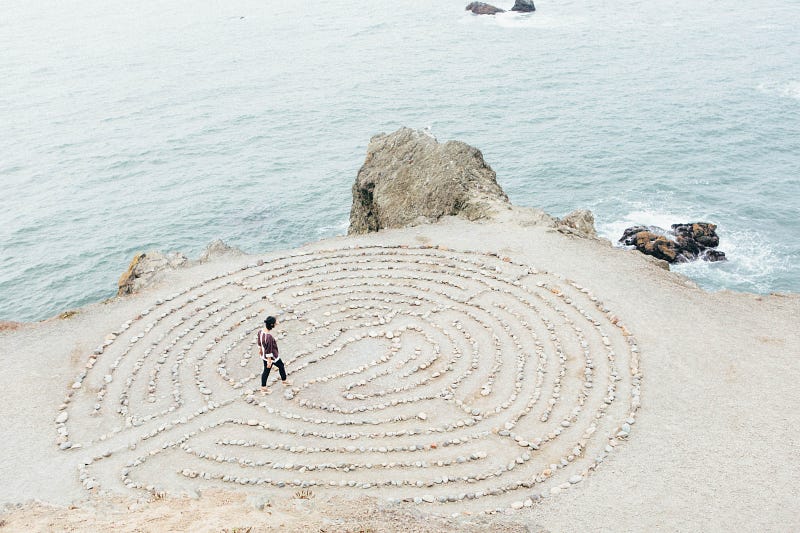# Five Mindful Practices to Ease Difficult Times Without Meditation
Written on
Chapter 1: Embracing Mindfulness
During my youth, I had a rather unsettling experience with meditation. At just fifteen, I felt an overwhelming sensation, as if a frantic bird was fluttering between my eyebrows. This led me to shy away from meditation for years. However, on my thirty-fifth birthday, my brother gifted me a complimentary meditation course, which piqued my curiosity about how others approached this practice.
I confided in the meditation teacher that the term “meditation” made me want to flee. He simply advised, “You don’t need to meditate; just close your eyes and either sleep or recall a joyful moment.” That conversation marked the beginning of my journey with meditation. I gradually learned to see meditation not as a daunting task but as a daily practice that I now cherish.
However, I recognize that many newcomers may find meditation challenging. The mindset that one must perform it flawlessly can be discouraging. Thankfully, there are simpler approaches—what I like to refer to as accessible pathways to mindfulness. These alternatives can help you cultivate a sense of calm during life's tumultuous times without engaging in traditional meditation techniques.
While these practices may appear basic, their simplicity is what makes them effective. You can easily implement them and experience immediate benefits.
Section 1.1: Gazing Through the Window
One of the most soothing practices I adopted during my time in Philadelphia back in 2009 was simply gazing out the window. With my roommates gone for the day, I often found myself alone in our 17th-floor apartment. I took comfort in the serene view of a nearby lake, using this practice to escape feelings of loneliness.
Staring out the window offers numerous advantages:
- It calms your mind
- Enhances your focus
- Connects you with nature (sky, trees, clouds, etc.)
- Provides a much-needed break from the digital world
Try incorporating this practice into your daily routine for a few days; it may transform your perspective entirely.
Subsection 1.1.1: Revisiting Photographs

In today's world, we capture countless moments with our smartphones. As you scroll through your photo gallery, ponder this: “How many of these images will I actually revisit?” The answer is often “a handful each year.”
Instead, dedicate a few minutes each day to reflect on your favorite photographs. Reviewing images from cherished memories can evoke joy and tranquility. If possible, seek out physical photo albums from the pre-digital age; these tangible memories often bring a deeper sense of happiness than their digital counterparts.
Section 1.2: Nature Walks
Walking is a beneficial way to alleviate stress, but what exactly is a nature walk? Rather than taking the same route each time, opt for a different path daily. This approach allows you to gain fresh perspectives and discover new environments.
As you explore, your mind will gradually quiet, and you’ll find yourself immersed in the experience rather than preoccupied with racing thoughts. This is why many creative individuals take brisk walks to spark new ideas.
Chapter 2: Creating a Peaceful Environment
Video Description: This 6-minute meditation guides you through a calming process to help you cope with life's challenges.
Decluttering your space can also provide mental clarity. Reflect on how much time you spend mindlessly jumping between apps. In the past, we didn’t face this constant distraction; we relied on newspapers and radios for information.
While mobile apps simplify life, they can also foster an unintentional addiction. Focus on retaining only essential applications, and you'll appreciate the clarity that comes with simplicity.
Section 2.1: The Power of Reading
In a recent conversation, I met a young man brimming with ambition, but I noticed a significant gap in his reading habits. When I inquired about the number of books he read monthly, his response left me concerned about his future success.
He replied, “Why would I read? I believe in action.” While taking action is crucial, reading equips you with the knowledge to:
- Determine necessary actions
- Know when to act or refrain
- Explore various methods of taking action
- Differentiate between mere actions and inspired actions
If you neglect reading, you're likely missing out on vital skills in your field. Reading can serve as a form of meditation in itself, providing insight and peace of mind. Commit to reading just ten pages a day, and you may be surprised by the positive changes you witness in yourself.
Final Thoughts
Meditation doesn't have to be confined to sitting still with closed eyes. You can incorporate mindfulness into your daily life in numerous ways. The five practices highlighted above can pave the way for a deeper understanding and appreciation of meditation in the long run.
Wishing you a year filled with blessings and growth!
Video Description: This mindful meditation guide is designed to help you navigate through uncertain and challenging times.